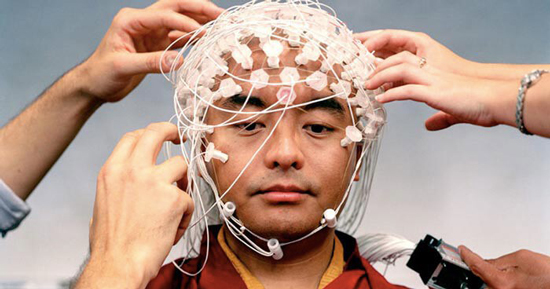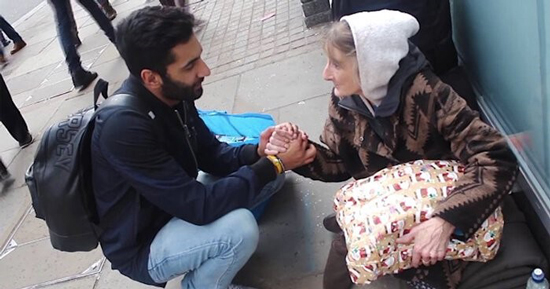The Neuroscience of Wellbeing

Science Reveals that Wellbeing is a Skill
Wellbeing is something that is hard to define and yet we all have an understanding of what it is. It derives from how you feel about yourself and your life, whether things are going well, and how you cope with stress. Wellbeing changes over time and is influenced by every aspect of our lives, from close friendships to feeling that you belong and a sense of purpose.
Neuroscientist Richard J. Davidson, founder of the Center for Healthy Minds, is one of the world’s leading experts on the impact of contemplative practices, such as mindfulness meditation, on the brain. He says that wellbeing is not a static thing –but a set of skills that we can practice and strengthen, just like learning to play a musical instrument or ride a bike.
Wellbeing is fundamentally no different than learning to play the cello. If one practices the skills of wellbeing, one will get better at it.
The Four Keys to Wellbeing
Research reveals there are four areas of mental training that can significantly improve your wellbeing: resilience, outlook, awareness, and generosity. “Each of these four is rooted in neural circuits, and each of these neural circuits exhibits plasticity”, explains Davidson. “So we know that if we exercise these circuits, they will strengthen.”
It’s easy to be content when things are going well but what about when we face hardship?
Practicing these four skills can provide the key to enduring change and increased wellbeing.
1. Resilience

Resilience, or how quickly we recover from adversity, influences the amount of negative emotion that we experience. The more resilient we can train ourselves to be, the better our wellbeing.
Some people recover from a failed exam or loss of a job slowly, while others are able to rebound more easily from adversity.
We know that individuals who show a more rapid recovery in certain key neural circuits have higher levels of wellbeing. They are protected in many ways from the adverse consequences of life’s slings and arrows.
One of the ways that Davidson has found to improve resilience is by regular practice of mindfulness meditation. It takes time to transform these specific brain circuits and you need many hours of practice before you see real change. “It’s not something that is going to happen quickly” he says. “But this insight can still motivate and inspire us to keep meditating.”
2. Outlook
Whether it’s savoring the last bite of chocolate cake or enjoying a family holiday, a positive outlook on life increases our wellbeing. “I use outlook to refer to the ability to see the positive in others” says Davidson. “The ability to savor positive experiences, the ability to see another human being as a human being who has innate basic goodness.”
Even people who suffer from depression show activation in the brain circuit underlying outlook, but in them, it doesn’t last – it’s very transient.
Here, unlike with resilience, research indicates that simple practices of loving-kindness and compassion meditation may alter this circuitry quite quickly, after a very, very modest dose of practice.
A recent study by Healthy Minds found that compassion training for 30 minutes a day for two weeks resulted not only in changes in the brain but also made it more likely for people to be kind and help others.
3. Awareness
When we really focus on what we’re doing, and our minds are not wandering, we actually feel better about ourselves.
Having a positive outlook helps wire our brains for greater wellbeing.

Researchers at Harvard conducted a study using an app, Track Your Happiness, that asked people three questions:
– What are you doing right now?
– Where is your mind right now? Is it focused on what you’re doing, or is it focused elsewhere?
– How happy or unhappy are you right now?
They found that 47% of the time people weren’t paying attention.
Can you envision a world where that number goes down a little, by even 5 percent? Imagine what impact that might have on productivity, on showing up, on being present with another person and deeply listening.
Philosopher and psychologist William James, author of The Principles of Psychology, says the ability to repeatedly bring back a wandering mind is the root of judgment, character, and will. Mindfulness brings us back to the present moment and deepens our connection to ourselves and others.
4. Generosity
When we act generously by volunteering at a homeless shelter or giving somebody a compliment, we become happier in ourselves. The ability to empathize, express gratitude and behave compassionately towards others are skills that can not only be learned, but also can make us feel happy.
There are now a plethora of data showing that when individuals engage in generous and altruistic behavior, they actually activate circuits in the brain that are key to fostering wellbeing.
Generosity towards others is a skill that can be strengthened, and makes us feel happy.

Davidson explains that these circuits get activated in a way that is more enduring than the way we respond to other positive incentives, such as winning a game or earning a prize. We’re not creating something new when we engage in practices that cultivate kindness, but simply developing our capacity for compassion. Davidson says: “What we’re doing is recognizing, strengthening, and nurturing a quality that was there from the outset.”
Shaping Our Brain
Davidson says that our brains are constantly being shaped wittingly or unwittingly – most of the time unwittingly. The science behind wellbeing as a skill makes “a kinder, wiser, more compassionate world possible”. What we know about neuroplasticity gives us the power to shape our minds with intention.
We have the opportunity to take more responsibility for the intentional shaping of our own minds and through that, we can shape our brains in ways that would enable these four fundamental constituents of wellbeing to be strengthened. In that way, we can take responsibility for our own minds.
By training our brain, we can create neural pathways for wellbeing, especially when we are faced with adversity. As Davidson says: “Happiness and wellbeing are best regarded as skills”. We just have to keep practicing.
yogaesoteric
October 6, 2018
